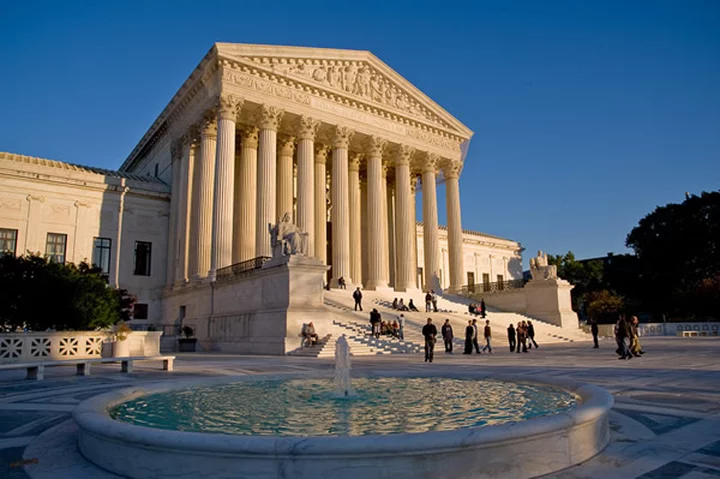West façade of the Supreme Court Building. | Photo via the U.S. Supreme Court.
###
PREVIOUSLY
- Federal Judge Tosses Class Action Suit Challenging Humboldt County’s Cannabis Code Enforcement Process
- Appeals Court Reverses Dismissal of Class Action Suit Challenging Humboldt County’s Cannabis Abatement Penalties, Sending the Case Back to District Court
###
Humboldt County has asked the U.S. Supreme Court not to hear a case challenging the legality of fines issued as part of its cannabis code enforcement process.
On Thursday, attorneys for the county filed a brief urging the Court to deny a petition to review Thomas v. Humboldt County, a case we’ve written about before. (See links above.) In that class action suit, local landowners argued that their constitutional rights to due process were violated when the Planning Department slapped them with exorbitant fines and fees for weed-related code violations, some of which stemmed from the activities of previous owners.
In their petition for review, the plaintiffs, represented by the nonprofit Institute for Justice, argue that the Seventh Amendment’s right to a jury trial should extend to instances wherein local governments issue civil penalties over alleged cannabis violations.
That’s not the way things have worked for the past hundred-odd years. Ever since the 1916 Supreme Court case Minneapolis & St. Louis R. Co. v. Bombolis, courts have held that the Seventh Amendment does not apply to states and local governments. But the Thomas plaintiffs argue that the Supreme Court should overturn that precedent, which would require places like Humboldt County to provide jury trials in civil penalties cases.
Their request, which runs to 300 pages and goes by the highfalutin legal terminology “Petition for a Writ of Certiorari,” says, “Places like Humboldt County, California, impose ruinous fines—and even take people’s homes—without ever proving the government’s case to a jury.”
Humboldt County’s system is particularly egregious, the writ argues.
“The County fines people millions of dollars for basic permitting and land-use violations that pose little or no harm to the community,” the writ states in its introduction. “Like many state and municipal governments, however, Humboldt channels these claims through administrative tribunals. Doing so deprives the accused of their fundamental right to a trial by jury.”
Another key element of the plaintiffs’ argument is that the “hearing officer” who’s charged with finding facts and making a ruling on the alleged code enforcement violations works for county code enforcement.
“Unsurprisingly, Humboldt never loses on its home court,” the writ observes.
But in its opposition brief, attorneys for the county say the original district court ruling was correct when it described plaintiffs’ allegations as “implausible and overwrought.” The plaintiffs all either created violations themselves or purchased properties knowing about existing violations — and more to the point, none of them have actually been fined; all penalties are merely “proposed,” according to the brief.
The brief concludes by saying “this is not the right time or vehicle to entertain the question” of whether the Seventh Amendment right to a jury trial should extend to states and local governments. A case involving the federal government would be better suited to review than one featuring tiny little Humboldt County, the county’s attorneys say.
Furthermore, they argue, this case “is based on an untested pleading with an implausible, indeed feverish, rendition of events,” and beyond that, it’s “rooted in federally illegal conduct — commercial cannabis cultivation.”
Messy, in other words.
However, some big guns are backing the play of the Institute for Justice. A pair of conservative think tanks — the Cato Institute and the Buckeye Institute — each filed an amicus brief urging the Supreme Court to grant review and overturn the Bombolis decision. So did Steven Calabresi, co-chairman of the Federalist Society, which has spent decades helping to pack the federal judiciary (including the Supreme Court itself) with right-wing appointees.
Still, the request is something of a long shot, just in terms of the math. The Supreme Court receives more than 7,000 of them each year but only agrees to hear between 100 and 150.
If you’d like to get deep into the weeds and read the briefs yourself, you can find links to all of the filings in this case on the Supreme Court’s website.

CLICK TO MANAGE